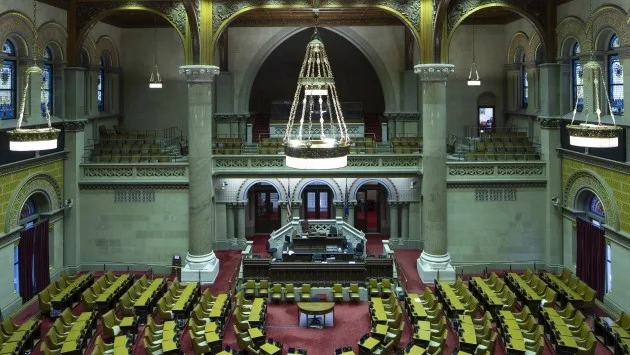
ALBANY- In a groundbreaking move this legislative session, a bill proposing the establishment of a reparations commission to address the historical injustices of slavery in New York has garnered significant support. Now, the bill’s sponsors are taking their message to the streets, advocating for the governor’s endorsement and embarking on an expansive statewide tour to engage the public.
Senator James Sanders, Jr., a Queens Democrat and the driving force behind the legislation, expressed the sponsors’ resolute determination to traverse every corner and crevice of the Empire State. He emphasized their commitment to “reach every nook and cranny within our illustrious state” and to “connect with individuals at their very core” as they fervently champion the bill.
The proposed legislation outlines the creation of a nine-person commission comprising three appointees from each of the governmental branches: the governor, Assembly, and Senate. Once assembled, this dynamic panel would convene six months following its formation, culminating in the submission of a comprehensive report within a year.
Drawing inspiration from California’s reparations commission, which recently advocated for a staggering $500 billion in restitution, the New York proposal is contextualized within the state’s massive budget, exceeding $200 billion. Senator Sanders, however, sought to underscore New York’s distinctive leadership, asserting that “while we applaud the endeavors of our fellow states, we also forge our own distinctive path.” He further emphasized that their ambition is to secure substantial measures without undermining the state’s fiscal stability.
One of the pivotal objectives of the envisioned commission lies in its role as an educational catalyst, intended to bridge the racial chasm associated with reparations. Senator Sanders articulated that such an initiative could potentially bridge the chasm, citing data from the Pew Research Center revealing that a mere 18 percent of Caucasian Americans endorse reparations, compared to an overwhelming 77 percent of African American counterparts.
In a significant display of commitment, a public forum was recently convened in Harlem, marking the first of many anticipated gatherings.
“We aspire to present our message before every conceivable audience,” said Senator Sanders.
Notably, the bill remains pending delivery to the governor’s desk. Once it lands, the governor is afforded a 10-day window (Sundays excluded) to either affix their signature or exercise a veto. Failing any decisive action within the stipulated period, the measure is vetoed by default, a legislative phenomenon commonly referred to as a “pocket veto.”

